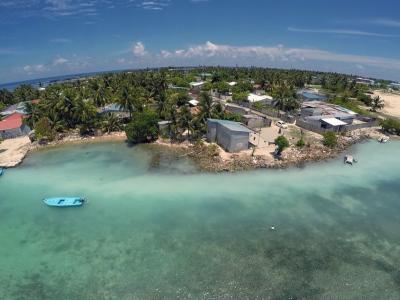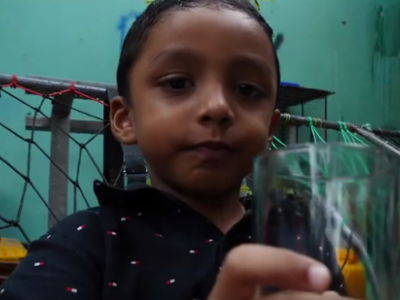
Photo:
Implemented by the Maldivian Ministry of Environment and Energy, the project Supporting vulnerable communities in Maldives to manage climate change-induced water shortages (2017 - 2023) targeted 49 islands across of 13 atolls of the country that continue to experience water shortages due to low rainfall and extended dry periods, brought on by a changing climate.
The project aimed to provide safe and reliable freshwater to 105,000 people, roughly 30 percent of the island nation's residents.
Under the project, water desalination facilities on four islands across the most vulnerable regions in the North were established, to serve as water production and distribution hubs for all seven Northern atolls during the dry season, lifting their dependency on the capital Male’ for emergency drinking water. The remaining 45 islands in both the north and south of Maldives will benefit from improved rainwater collection infrastructure, combined with groundwater protection and improvements.
- Community
- District
- National
- Country Office
- Local Governments
- National Governments
295,000 (105,000 people in the outer islands of Maldives)
- Ministry of Environment and Energy, Maldives Government
- Green Climate Fund
- United Nations Development Programme (UNDP)
Expected outcomes
Output 3: Aquifers recharged and protected
The Maldives consists of 1,190 small, low-lying coral islands spread across 90,000 square kilometers. Its estimated population of 399,000 is scattered over 194 main islands. With high-end tourism as the main driver of economic growth, the country has made significant development progress since its independence in 1965.
However, national aggregate indicators of progress conceal underlying inequalities. A significant disparity between people living in the capital, Malé, and those living in other atolls is reflected in conspicuous differences in their human development indices. The outer island communities are especially vulnerable to the effects of extreme weather events, rainfall distribution anomalies, and sea level rise.
Observed experiences during the last decade bear out the risks of climate change. In 2004, an estimated 30 percent of the outer islands’ population experienced water shortages, and since 2005 an average of 81 islands had requested emergency shipments of water to be delivered from Malé during the annual dry season. The calls for emergency shipments have intensified as the rainfalls become more erratic and dryer seasons dryer, and as a result, islands’ stored rainwater reserves become depleted. This has resulted on an average of 3,500 liters shipped out from Malé annually during the last ten years. During 2005-2012, the National Disaster Management Centre (NDMC) spent US$2.4 million (annual average of US$300,000) to provide desalinated water to over 90 islands.
Difference in geography (land availability), hydro-climatic characteristics (rainfall amounts and distribution patterns) and socio-economic conditions (population size, density, growth trends, and socio-economic status) suggest the need for decentralised and fully customised approaches to water production and distribution to achieve island and atoll level self-sufficiency.
The Maldivian government faces severe constraints in responding to the country’s present and future water security challenges. Firstly, the precarious fiscal status limits the response options to largely reactive emergency measures. Longer-term solutions, without additional financial support, are out of reach. Secondly, a dispersed and small population prevents the possibility of economies of scale in providing water and sanitation services, as well as capital infrastructure.
In response to climate change risks and challenges, the project will provide sufficient water to supply the potable water needs of island residents year round for a 35 year design period (to 2050). Project finance will be used to establish an integrated water resources management system that integrates the three main sources of water (rainwater, groundwater, and desalinated water) into a least cost delivery system. The project will: (i) increase rainfall collection capacity in target 49 islands at least threefold; (ii) improve groundwater management, including monitoring, effective replenishment and controlled extraction; and (iii) increase water production capacity through solar-based desalinization to secure sufficient back up resources for timely distribution to island households during extended dry periods. This system will be able to maintain service levels against a context of rainfall variability and sea level rise.
Ultimately, the project will achieve an uninterrupted water supply on islands that currently experience chronic 90-day water shortages during the dry season. As a result of the project, 49 priority islands will have increased rainwater collection capacities. Out of these, 4 of the larger islands will also install desalination-based water production systems. These systems will secure sufficient water production capacity, enabling decentralised and timely water distribution across all northern outer atolls during the extended dry periods, when shortages may occur.
Finally, early water alerts, based on forecasted meteorological information will feed into the Standard Operating Procedures (SOPs) for system management. In addition to actual investments in water production and distribution the project will support more advanced management capabilities of the utilities for greater efficiency that anticipated climate change driven challenges and complexities demand.
The Way of Water by UNDP Maldives on on Exposure
Project Document signature between UNDP and Government: 29 May 2017
'Towards a climate resilient future in the water sector: Government of Maldives Signs Project Document with UNDP' - May 12, 2017. UNDP Maldives announce official signing with the Ministry for the delivery of safe and secure freshwater for vulnerable communites via the 'Supporting Vulnerable Communities to Manage Climate Change Induced Water Shortages'
‘Protecting (scarce) fresh water in the Maldives’ - April 15, 2016. Keti Chachibaia, Regional Technical Specialist for Climate Change Adaptation, UNDP’s Bangkok Regional Hub, throws light on water security in the Maldives and how funding from the Green Climate Fund will help make vulnerable communities more resilient in the face of climate change.pulation) in the islands of Maldives in the face of climate change risks.
‘Green Climate Fund approves first 8 Investments’ - November 2,2015. The Green Climate Fund announces the approval of funding for eight new projects, including the Maldives proposal for 'Supporting Vulnerable Communities to Manage Climate Change Induced Water Shortages' (GCF funding: 23.6 million)
Maldives GCF-funded water project to build resilience of vulnerable
Output 1: Scaling up an integrated water supply systems to provide safe water to 32,000 people
- 11,502 rainwater harvesting systems for 26,000 residents in 45 islands installed;
- Standard operating Procedures (SOPs) prepared and used by utilities, local councils and households;
- 4 RO desalination water plants in 4 islands installed and made operational, using a grid-tied and / or off grid solar PV technology to provide backup capacity in times of water stress;
- Groundwater recharge system installed for excess rainwater from the RWH collection system on 49 islands, including grey water recycling on selected islands;
- Tariff evaluation criteria and tariff setting guidelines designed and introduced;
- Training programmes in integrated water resource management, planning and budgeting, water economic modeling, expenditure management and performance monitoring developed and delivered for relevant atoll and island councils and the ministries (MEE, MoH); and
- Certification courses for the utilities and sector specialists in the areas of water engineering, capital construction, operation, maintenance, financial management and planning introduced at the Maldivian Polytechnic training institute (MP).
Output 2: Dry Season water production and distribution
- 4 sub-national water production and distribution locations to serve all Northern atolls established;
- Institutional coordination and accountability mechanisms between the utilities, the NDMC, MEE and LGA/ councils to facilitate cost-effective and timely water supply during dry season;
- Regulatory framework for competitive and wholesale water distribution services established;
- Early warning system established on the basis of forecasted meteorological information for water emergency alerts and for effective operation of integrated water system.
Output 3: Aquifers recharged and protected
- Baseline assessment (hazards inventory and catchment characterization) completed;
- Groundwater monitoring protocols with associated equipment and training delivered;
- Regulatory framework established for coastal land use, including zoning to protect coastal catchment areas and enable natural recharge of groundwater lenses.
Project-level monitoring and evaluation will be undertaken in compliance with the UNDP POPP and the UNDP Evaluation Policy. The Project Manager that will be in charge of running the project on behalf of Department of Disaster Management Affairs (DoDMA) will be responsible for day-to-day project monitoring. S/he will develop annual work plans to ensure the efficient implementation of the project.
The UNDP Country Office will conduct, within other monitoring activities, annual supervision missions. The UNDP Country Office will be responsible for complying with UNDP project-level M&E requirements. Additional M&E, implementation quality assurance, and troubleshooting support will be provided by the UNDP Regional Technical Advisor as needed.
A Project Implementation Report (PIR) will be prepared for each year of project implementation. The Project Manager, the UNDP Country Office, and the UNDP Regional Technical Advisor will provide objective input to the annual PIR. The Project Manager will ensure that the indicators included in the project results framework are monitored annually well in advance of the PIR submission deadline and will objectively report progress in the Development Objective tab of the PIR. The annual PIR will be shared with the Project Board and other stakeholders.
An independent mid-term review (MTR) process will be undertaken and the findings and responses outlined in the management response will be incorporated as recommendations for enhanced implementation during the final half of the project’s duration.
An independent terminal evaluation (TE) will take place no later than three months prior to operational closure of the project. UNDP Country Office will include the planned project terminal evaluation in the UNDP Country Office evaluation plan, and will upload the final terminal evaluation report in English and the management response to the public UNDP Evaluation Resource Centre (ERC) (www.erc.undp.org). The MTR and TE will be carried out by an independent evaluator. The evaluation report prepared by the independent evaluator is then quality assessed and rated by the UNDP Independent Evaluation Office.






